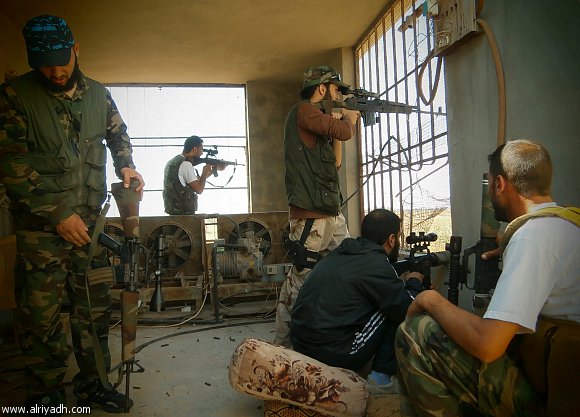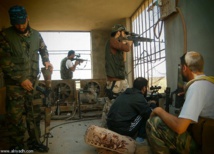More than 40 months on, the regime is estimated to still control 40 percent of inhabited territory, compared with 25 percent both for the rebels and the IS, and 10 percent for Kurds.
In eastern Damascus, the fiercest fighting in months raged between opposition and regime fighters at the entrance to the rebel-held district of Jobar, said the Syrian Observatory for Human Rights.
Jobar is under the control of opposition fighters, but is surrounded by army-held areas that lead into the capital, Assad's stronghold and the seat of his power.
Tuesday's fighting came a week after rebels broke across army lines and seized a checkpoint, inching ever closer to the strategic Abbasiyeen square. The army then launched a counter-offensive, and recaptured the checkpoint.
The air force pounded Jobar, while the army and pro-regime paramilitary forces sent in reinforcements to try to push back the rebel fighters.
An AFP correspondent nearby reported hearing "very loud explosions" that began overnight and were still rocking the area on Tuesday afternoon.
Jobar is important because it is located at the entrance to the besieged, rebel-held Eastern Ghouta area on the outskirts of the capital. It is also crucial because it is at the gates of Damascus.
- Divided opposition -
Since its creation in 2012, the main opposition National Coalition, which is backed by the West, has been undermined by sharp divisions between factions supported by Saudi Arabia and Qatar.
The bloc has also been weakened by its inability to secure game-changing international assistance for rebels seeking Assad's overthrow, while the regime has received an endless stream of help from its Russian and Iranian allies.
And in the latest blow to its unity, opposition government chief Ahmad Tohme was sacked on Tuesday due to the rivalry between the group's Saudi and Qatari-backed camps.
Tohme, who had been named head of the opposition's interim government 10 months ago and who was close to the Muslim Brotherhood, was sacked when "Saudi Arabia let its allies know that they needed to cut ties with the group," said Samir Nashar, a veteran dissident and Coalition member.
The National Coalition is recognised by scores of states and organisations as a legitimate representative of the Syrian people.
However, the exiled group has been accused by rebels and activists of being "disconnected" from reality on the ground, as well as of corruption and subservience to its backers in Riyadh and Doha.
- EU expands sanctions -
Meanwhile, European Union foreign ministers agreed Tuesday to expand sanctions against Syria over the government's "violent repression" of its civilian population.
The decision brings the total number of people on the EU's Syria sanctions list to 192, alongside 62 entities.
Western critics of Assad's regime have been hesitant to back the rebels, citing fears weapons could end up in the hands of extremists.
But at the same time, the extremist Islamic State -- which is notorious for its mass kidnappings, summary executions and crucifixions -- has been growing in strength.
The jihadist group has been seemingly unstoppable in recent months, with its fighters overrunning all of the oil fields in the eastern province of Deir Ezzor.
On Tuesday, Syria's Oil Minister Suleiman Abbas said the country's oil and gas industries have suffered total losses of $21.4 billion since the outbreak of the conflict.
The civil war has also ignited an alarming humanitarian crisis, with half the population suffering from hunger, according to the United Nations.
On Tuesday, the world body called for help to vaccinate 765,000 Syrian toddlers against polio, in a bid to prevent a resurgence of the childhood killer.
The conflict began as a peaceful revolt demanding democratic change but transformed into a war when Assad's regime unleashed a brutal crackdown. Many months into the fighting, jihadists started streaming into the country.
-------------------------------------------------------------------------------------------------------------
In eastern Damascus, the fiercest fighting in months raged between opposition and regime fighters at the entrance to the rebel-held district of Jobar, said the Syrian Observatory for Human Rights.
Jobar is under the control of opposition fighters, but is surrounded by army-held areas that lead into the capital, Assad's stronghold and the seat of his power.
Tuesday's fighting came a week after rebels broke across army lines and seized a checkpoint, inching ever closer to the strategic Abbasiyeen square. The army then launched a counter-offensive, and recaptured the checkpoint.
The air force pounded Jobar, while the army and pro-regime paramilitary forces sent in reinforcements to try to push back the rebel fighters.
An AFP correspondent nearby reported hearing "very loud explosions" that began overnight and were still rocking the area on Tuesday afternoon.
Jobar is important because it is located at the entrance to the besieged, rebel-held Eastern Ghouta area on the outskirts of the capital. It is also crucial because it is at the gates of Damascus.
- Divided opposition -
Since its creation in 2012, the main opposition National Coalition, which is backed by the West, has been undermined by sharp divisions between factions supported by Saudi Arabia and Qatar.
The bloc has also been weakened by its inability to secure game-changing international assistance for rebels seeking Assad's overthrow, while the regime has received an endless stream of help from its Russian and Iranian allies.
And in the latest blow to its unity, opposition government chief Ahmad Tohme was sacked on Tuesday due to the rivalry between the group's Saudi and Qatari-backed camps.
Tohme, who had been named head of the opposition's interim government 10 months ago and who was close to the Muslim Brotherhood, was sacked when "Saudi Arabia let its allies know that they needed to cut ties with the group," said Samir Nashar, a veteran dissident and Coalition member.
The National Coalition is recognised by scores of states and organisations as a legitimate representative of the Syrian people.
However, the exiled group has been accused by rebels and activists of being "disconnected" from reality on the ground, as well as of corruption and subservience to its backers in Riyadh and Doha.
- EU expands sanctions -
Meanwhile, European Union foreign ministers agreed Tuesday to expand sanctions against Syria over the government's "violent repression" of its civilian population.
The decision brings the total number of people on the EU's Syria sanctions list to 192, alongside 62 entities.
Western critics of Assad's regime have been hesitant to back the rebels, citing fears weapons could end up in the hands of extremists.
But at the same time, the extremist Islamic State -- which is notorious for its mass kidnappings, summary executions and crucifixions -- has been growing in strength.
The jihadist group has been seemingly unstoppable in recent months, with its fighters overrunning all of the oil fields in the eastern province of Deir Ezzor.
On Tuesday, Syria's Oil Minister Suleiman Abbas said the country's oil and gas industries have suffered total losses of $21.4 billion since the outbreak of the conflict.
The civil war has also ignited an alarming humanitarian crisis, with half the population suffering from hunger, according to the United Nations.
On Tuesday, the world body called for help to vaccinate 765,000 Syrian toddlers against polio, in a bid to prevent a resurgence of the childhood killer.
The conflict began as a peaceful revolt demanding democratic change but transformed into a war when Assad's regime unleashed a brutal crackdown. Many months into the fighting, jihadists started streaming into the country.
-------------------------------------------------------------------------------------------------------------









 Home
Home Politics
Politics











